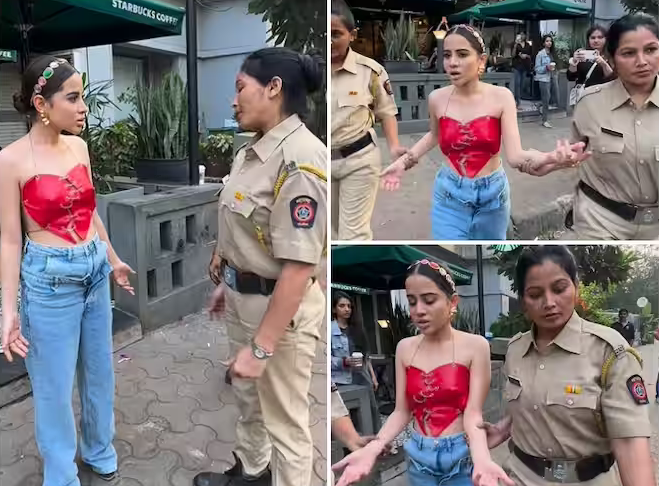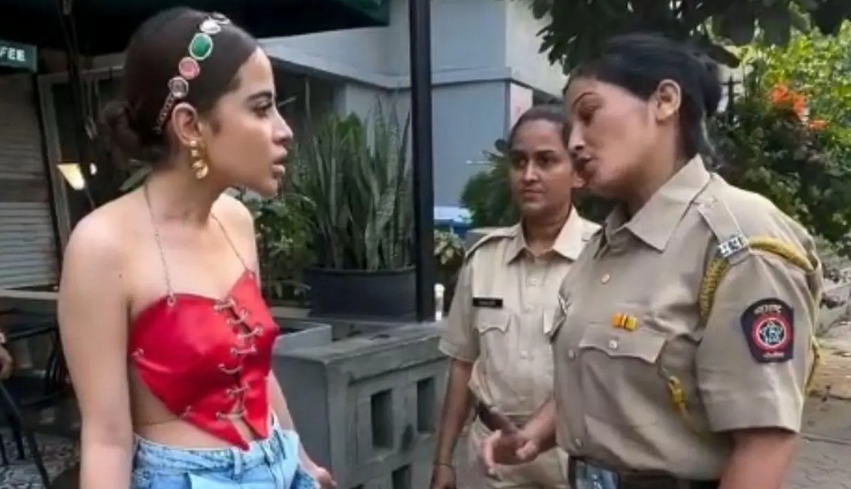In the age of instant sharing and viral trends on social media, it’s not uncommon to come across sensational videos that leave us questioning the authenticity of what we see. Recently, a viral video featuring actress and model Urfi Javed being allegedly arrested by two women dressed as police officers raised concerns and caught the attention of both the public and the Mumbai Police. The video, which initially sparked worries about Uorfi’s arrest for her fashion choices, has been exposed as a sham, leading the Mumbai Police to take decisive action.
In response to the misleading viral video, the Mumbai Police has registered a criminal case against those responsible for the creation and dissemination of this deceptive content. The police emphasized that they cannot tolerate the misuse of their uniform and insignia for the sake of cheap publicity. This incident serves as a stark reminder of the potential consequences of spreading misinformation and using the authority of law enforcement for personal gains.

The Deceptive Viral Video: Urfi Javed’s Fake Arrest
The viral video in question, which began circulating on social media, depicted actress and model Urfi Javed being apprehended by two women posing as police officers. The purported reason for her arrest was cited as her choice of bold and unconventional attire. In the video, Urfi is shown being escorted into a vehicle by the women, sparking a wave of concern and speculation.
The video’s apparent theme of obscenity and the use of the Mumbai Police uniform and insignia led to a widespread outcry, with many viewers expressing their worries about Urfi’s arrest and the implications for personal expression and individual rights in society. However, the Mumbai Police acted swiftly to clarify the situation and reveal the video’s fraudulent nature.
Mumbai Police’s Response: Upholding the Law and Dismantling Misinformation
In a strongly worded statement posted on Twitter, the Mumbai Police asserted their commitment to upholding the rule of law and preventing the misuse of their authority for the sake of gaining cheap publicity. They firmly declared that the viral video was a work of fiction in which the insignia and uniform of the Mumbai Police had been misused for misleading purposes.
“One Can’t Violate Law Of The Land, For Cheap Publicity! A viral video of a woman being allegedly arrested by Mumbai Police, in a case of obscenity is not true – insignia & uniform has been misused,” stated the Mumbai Police in their Twitter post.
However, the police did not stop at a mere clarification. They took concrete steps to address the issue and ensure accountability. A criminal case was registered against those responsible for the misleading video under sections 171, 419, 500, and 34 of the Indian Penal Code (IPC). While the investigation is ongoing, the fake police inspector involved in the video, identified as Ganpatbhai Sawajibhai Makwana, has been apprehended, and the vehicle featured in the video has been seized.

The Use of Section 41A of the Criminal Procedure Code (CrPC)
In addition to filing a criminal case against the creators of the fake video, the Mumbai Police has also invoked Section 41A of the Criminal Procedure Code (CrPC). This section grants law enforcement authorities the power to issue a notice to an individual for the purpose of an investigation. In this case, the notice was served to the fake police inspector, Ganpatbhai Sawajibhai Makwana, further underlining the seriousness with which the Mumbai Police is treating this matter.
Implications and Lessons Learned
The incident involving Urfi Javed’s fake arrest video highlights the broader issue of misinformation and the potential misuse of the authority vested in institutions like the police. It serves as a case study for the digital age, where the power of social media and viral content can have far-reaching consequences. There are several key takeaways from this incident:
- Misinformation and Fake News: The incident underscores the need for vigilance when consuming content online. In an era where misinformation and fake news can spread rapidly, it is crucial to verify the authenticity of the information before forming opinions or taking action.
- Accountability: The Mumbai Police’s swift response and the initiation of legal proceedings against those responsible demonstrate that accountability for spreading false information is essential. This not only protects individuals from false allegations but also safeguards the integrity of law enforcement agencies.
- Misuse of Authority: The incident also sheds light on the potential misuse of authority by impersonating law enforcement officials. Such actions not only undermine trust in the police but can also have serious legal consequences.
- Balancing Freedom of Expression: The incident raises questions about the limits of freedom of expression and personal choice. While individuals have the right to express themselves through their clothing and lifestyle, there is also a responsibility to respect societal norms and laws.
In conclusion, the Mumbai Police’s response to the fake arrest video of Urfi Javed serves as a reminder of the importance of upholding the law, preventing the misuse of authority, and combatting the spread of misinformation. This incident highlights the power and reach of social media in shaping public perceptions and underscores the necessity for individuals to exercise caution and critical thinking when engaging with online content. Ultimately, it is a lesson in the responsibilities that come with freedom of expression and the consequences of exploiting the authority of law enforcement for personal gain.









